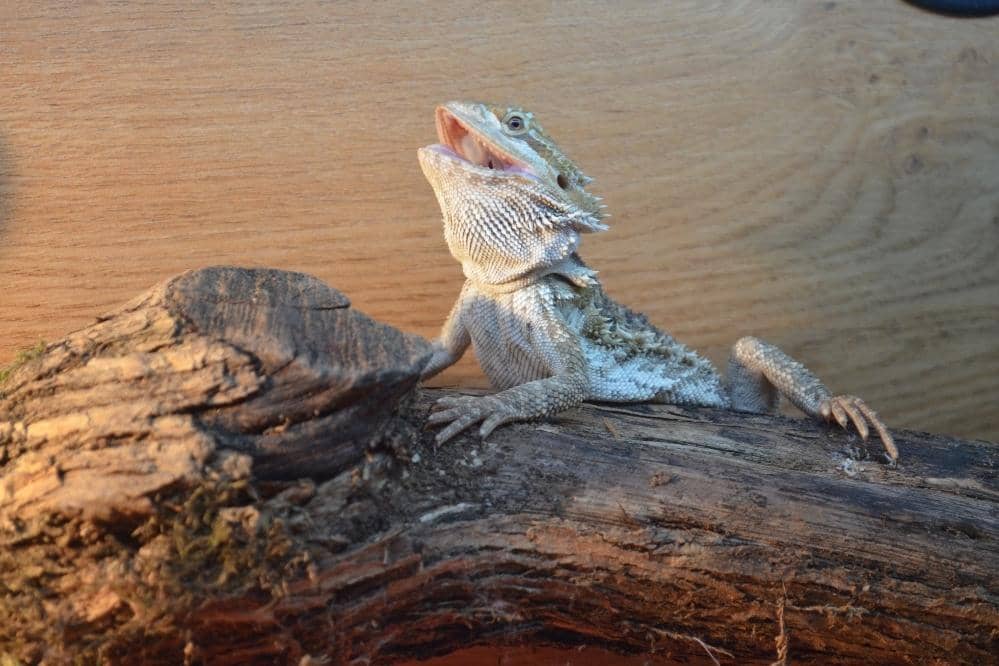Although bearded dragons make a good pet, they are different pets altogether regarding their look, husbandry needs, unique behavior, and characteristics. They often make strange moves like head bobbing, puffing up, arms waving, etc., but the behavior that looks most weird is holding their mouths open constantly. Most of their strange actions are due to the genes they inherited from their ancestors and the consequence of evolution. Usually, none of the activities (like head bobbing, arm waving, etc.) bothers the new owners, and they may consider everything normal. However, it is difficult to digest for many novice beardie owners to see their bearded dragon sitting with mouth wide open, and they get nervous and worried. In fact, “why does my bearded dragon hold his mouth open” is the most frequently asked question by beardie owners at vet clinics and on social platforms.
There are several possible causes, which we have discussed below. Most of them are part of their normal behavior; only a few show signs of illness and require you to respond quickly.
Temperature Regulation
The most common cause of why bearded dragons open their mouths is to regulate their body temperature. When keeping the mouth open to regulate the body temperature, the behavior is called “gaping” in bearded dragons. Beardies are exothermic or cold animals, which mean they can’t regulate their body temperature by producing internal heat. So they continuously depend on the external heat source to absorb heat (necessary to digest food and perform other crucial functions).
Therefore (as bearded dragon owners, we all know that), they spend most of their time basking under the heat source to absorb heat. Unlike humans, bearded dragons don’t have sweat glands, so when they feel too hot, they open their mouths to dissipate heat to the environment and cool down their bodies.
Instead of continuously keeping their mouths open ( due to overheating), Sometimes you may have observed that your beardie is sitting in the basking areas and opens and closes his mouth continuously after short intervals. Adult bearded dragons need to maintain their body temperature within an optimum range of 95° F – 110° F, so they open and close their mouths to keep their body temperature within this optimum range.
So gaping or opening and closing the mouth is their natural way to regulate body temperature; however, if they appear to be uncomfortable or gaping while sitting in a cool spot, it shows something fishy and needs your attention to sort it out.
Aggressive Behavior
Generally, bearded dragons are docile, calm, friendly reptiles, and placid and make a good pet. However, instinctively, bearded dragons are extremely territorial and solitary. So sometimes they get afraid or feel threatened by such small things which we consider trivial or harmless (e.g., loud noises, the presence of another lizard, children, or other large pets like dogs or cats hovering around beardie’s chamber). Like all animals, an afraid bearded dragon has options to enter fight or flight mode. By nature, bearded dragons mostly opt to enter fight mode. So they try to stand tall with their mouth open to look aggressive and dominant. However, with an open mouth, an aggressive bearded dragon also exhibits signs like fasthead bobbing, puffed up beard, black beard, hissing, etc.
Mating Season
As soon as the mating season arrives, the bearded dragons experience many hormonal changes. These hormonal changes make them show aggression and territorial behavior more than usual. So they open and close their mouth frequently and stand tall to impress to female beardie or frighten the potential intruder.
This is also a natural behavior of bearded dragons, and you don’t need to manage anything. Even if you try to calm them, they can attack you. So the best strategy is to wait and let this phase pass. Soon your beardie will be relaxed and calm, and everything will return to normal once the hormones return to their normal state.
Stretching & Shedding
Shedding is the natural process in reptiles to get rid of old skin and replace it with new skin. Baby bearded dragons shed more frequently (after every two months) than adult beardies, who usually shed once or twice a year. You may have noticed your bearded dragon opening and closing his mouth at shorter intervals than gaping; he is actually stretching the skin (especially in the neck area). Generally, bearded dragons stretch their skin just before the shedding going to start. The purpose of stretching is to loosen the skin around the neck, which makes the process of shedding easier and quicker. You may have also seen your beardie puffing and stretching at the same time because puffing help loosens the skin more effectively.
Although mostly bearded dragons stretch just before the shedding, occasionally, they also stretch long before the stretching is due. The objective of stretching in advance is to prevent the skin from getting too tight and keep it flexible, loose, and supple.
So stretching is also normal behavior. So nothing to worry about if you see your bearded friend slightly opening and closing his mouth and puffing soon after that.
Putting The Enclosure Close To the Window
Putting your beardie’s enclosure near the window seems to be a good idea. Because seeing the floating clouds and wind rustling, the trees give your bearded dragon a glimpse of its natural habitat. However, birds or cats can be a source of continuous stress and fear for your bearded friend. So if the exposure continues for long, it can make your bearded dragon open his mouth and show other signs of aggression.
Again, if something like that is happening, there is nothing to be concerned about. Just change the location of the enclosure, and the problem is solved.
Respiratory Infection
If your bearded friend continuously keeps his mouth open for a long time and makes a clicking sound along with respiration, it can indicate a respiratory tract infection. In case of respiratory infection, other signs like off-feed, dull eyes filled with mucus, sneezing, etc., are also present. Since bearded dragons have evolved to live in dry and hot environments, they develop respiratory infections when the humidity inside the enclosure is continuously above 40% for a long duration.
So if you observe any of such signs, take your beardie to the vet immediately. To prevent such incidents in the future, install a hygrometer (an instrument that tells humidity) and ensure that humidity doesn’t go above 40%.
Closing Thoughts
There are plenty of reasons for your bearded dragon to keep his open mouth. But fortunately, most of them are natural and nothing to be concerned about if you have managed things well. However, a few conditions are there in which your bearded friend needs your assistance and immediate veterinary care.
I hope this article has provided enough information about “Why Do Bearded Dragons Hold Their Mouths Open?” and how you can handle different situations. So you will not be a confused and worried person anymore if you see your bearded dragon with an open mouth again.

